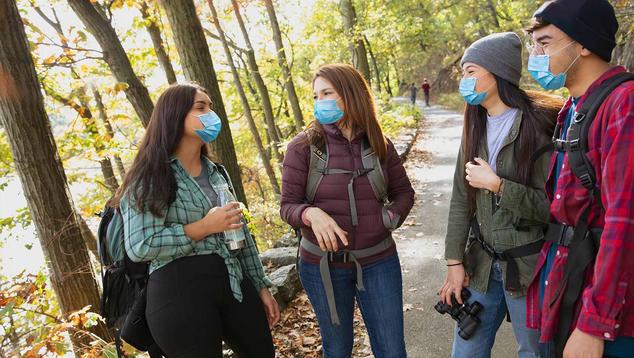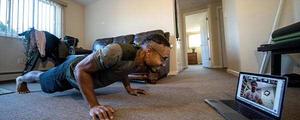As 2020 mercifully retreats in the rearview mirror, 2021 provides us with a unique opportunity to reset our wellbeing. Gallup defines wellbeing as encompassing five essential elements: career, social, financial, physical and community. Research has shown the critical importance of holistic wellbeing (i.e., having high wellbeing across all five essential elements) compared with physical wellness alone in elevating key health, community and business outcomes. As such, as we turn the page on a rough year and look to the future, now is the right time to set about moving wellbeing back to the forefront of our lives.
- Career wellbeing: You like what you do every day.
- Social wellbeing: You have meaningful friendships in your life.
- Financial wellbeing: You manage your money well.
- Physical wellbeing: You have energy to get things done.
- Community wellbeing: You like where you live.
New Year's Resolutions for Better Wellbeing
Gallup recently published 10 ideas for workplace leaders to build employee engagement and wellbeing at the same time. As a follow-up, here are 14 simple-to-implement ideas that address each element of wellbeing in our lives at home.
- Career: Set daily, weekly and monthly goals.
- Setting and reaching goals is a big part of wellbeing. The problem is that not all of us are motivated by goal setting -- and for some of us, goals only manifest themselves in the form of big, long-term aspirations packaged in annual or multiyear time frames.
- To get past this barrier, divide your time periods as much as possible, with multiple goals that can be achieved over the course of a single day. This will allow for multiple victories each day, week and month, and is a proven reliever of stress and worry.
- Financial: Assess and reassess your household budget.
- In uncertain economic times, many of us have found ourselves out of work or suffering pay cuts as part of the pandemic. Even if you aren't among this group, it's a great practice to proactively determine how best to reduce your household budget if the need arises.
- Start by considering what you can live without right now, with a plan to eliminate these items if income reduction hits your household. Shoot for budget reductions that will accommodate both a 10% and a 20% decrease in household income. Doing so will reduce anxiety and increase enjoyment on an ongoing basis and will leave you prepared for future household economic events.
- Community: Volunteer in ways that get noticed.
- Volunteerism is an important aspect of community wellbeing. Volunteering enhances your attachment to your community and also increases the chances that you feel safer living within it. Furthermore, the power of volunteerism in impacting wellbeing grows substantially when it comes with external recognition for your efforts, which has the effect of more greatly building your emotional attachment to the area where you live and to the people who live there.
- In the COVID era, volunteerism obviously has to be done in a responsible manner. No hugging, no high fives, and wear your mask! But giving back to your community is proven to enhance your pride in it -- and doing so will remind you that you can still be a good neighbor even amid a pandemic. It's also a great stress reliever.
- Physical: Get to the dentist.
- Only about two-thirds of American adults make it to the dentist every 12 months, leaving tens of millions of people inadequately caring for their teeth and failing to capitalize on an often overlooked but important way to improve your wellbeing.
- Way beyond periodontal disease, poor oral health is linked to many significant health outcomes downstream, including endocarditis, cardiovascular disease, birth complications and pneumonia.
- Equally important, those who regularly get to the dentist -- after controlling for all major demographics such as income and education -- think about and evaluate their lives better than those who don't. In this manner, good oral health serves as an important psychological trigger; taking care of our mouths means taking care of our lives.
- Career: Learn your strengths and apply them routinely.
- Strengths usage is also highly influential to both wellbeing and engagement. For example, workers who strongly agree that they use their strengths to do what they do best are substantially more likely to have high levels of wellbeing (i.e., to be "thriving") across all five elements. Employees whose managers focus on their workers' strengths -- about 37% of all employees -- are also vastly more likely to be engaged in their jobs (61%) than to be actively disengaged (1%). In contrast, employees working for managers who ignore their workers' strengths are 40 times more likely to be actively disengaged than engaged.
- Take the CliftonStrengths assessment and get feedback from a certified strengths coach. Regularly discuss your strengths with the people you live or work with to better understand your mutual strengths and how to apply this knowledge in a practical way each day.
- Physical: Move your body every hour.
- Now more than ever, moving our bodies is critical to our physical and emotional health. Spend five minutes out of every hour in motion. Weather permitting, walk up and down the block around your home. Weather not permitting, walk around your house, with a focus on the stairs. No house? Exit your apartment and walk the stairs of your building!
- Physical: Never, ever ride when you can walk.
- Unless you are on the 10th (or 20th, or 50th) floor, take the stairs instead of the elevator. Same thing when you encounter the escalator or moving walkway.
- Physical: Make your bed every single morning.
- Being active and productive every day is a critical part of physical wellbeing. One easy way to start every day with a check mark in the "active and productive" category is to make your bed. It's simple, it's quick, and it gives you an early win each morning to start your day off with a sense of momentum.
- Social: Find someone who cares about your wellbeing, and care for someone else's wellbeing in return.
- The buddy system is a proven driver of overall wellbeing, and social wellbeing in particular. Discover how good you feel about your relationship with your accountability partner when you encourage them to make positive wellbeing choices each day and they do so for you in return.
- Added bonus: Having a partner in health and wellbeing is closely related to experiencing happiness and enjoyment each day.
- Physical: Get your sleep: not too much, not too little.
- Sleep is really, really important to wellbeing. And no, the optimum amount is not five hours per night. Or six. Or seven. For all adults up to age 64, the optimum number of hours of sleep each night for wellbeing is eight. This only ticks down to seven hours for those aged 65 and older.
- Physical: Drink in moderation.
- For those who don't drink alcohol, this one does not apply to you. For those who do, though, moderate drinkers have better wellbeing than both heavy drinkers and non-drinkers (after controlling for all major demographics, including income and education). Moderate drinkers carry less stress, miss fewer days of work, are less likely to have diabetes, are less likely to suffer a heart attack and rate their lives better.
- Your recipe for maximizing your wellbeing: No more than seven drinks per week; no more than two per day; no more than five drinks in any three-day period.
- Social/Community/Career/Physical: Go to your place of worship regularly.
- This is a little trickier in the COVID era, so for many of us, worship remains a virtual activity until vaccinations become much wider spread. But high religiosity -- defined by routine attendance coupled with high levels of perceived importance on attendance -- is linked to an array of enhanced wellbeing outcomes, including reduced depression and daily worry and better health habits such as exercise, eating well and not smoking.
- And, this wellbeing advantage holds across every major faith group in the U.S., including the small percentage of people not affiliated with a particular religion who nevertheless attend services regularly and place high value in doing so.
- Career: Learn or do new and interesting things every day.
- Intellectually curious persons are much more likely to have high wellbeing and to be found in high-wellbeing communities, and communities that provide residents with opportunities to do new and interesting things are usually among the highest-wellbeing places in the U.S. A key aspect of wellbeing, learning and doing interesting things enhances life satisfaction and reduces the odds of suffering from boredom, sadness and clinical diagnoses of depression.
- One simple way to drive this in your own home each day is at the dinner table. Have each person take turns sharing something new and interesting that they learned or did that day. Then, have each person make at least one comment or ask one question to learn more or expand the conversation. Now more than ever, information is life.
- All five elements: Keep a regularly updated log of your wellbeing behaviors.
- This doesn't have to be daily, but it should be at least weekly. Record your sleep, exercise and eating habits (there are lots of wearable fitness trackers and mobile apps to help with this), but also record what you did each day to buttress your social, community, financial and career wellbeing. Then, record how you rate your life generally and the emotions -- either positive or negative -- that you experienced during that period. How do your behaviors relate to these self-evaluations and experiences?
- Research has shown that those who document their wellbeing activities on a regular basis are more likely to have their wellbeing improve over time, probably because it keeps wellbeing top of mind for those who do so.
The Bottom Line
Often times, improving wellbeing requires only slight shifts in behavior -- and you may find that with some small new commitments, you can make big strides toward a life well-lived. Give some of these ideas a try and see what becomes of your wellbeing on the other side. You might be surprised at what you discover.
Dan Witters is Research Director of the Gallup National Health and Well-Being Index.




